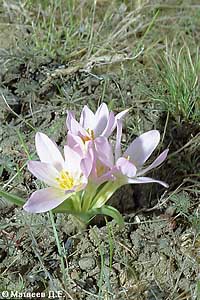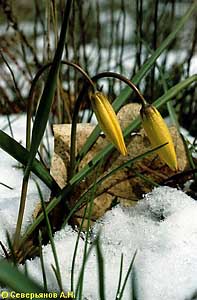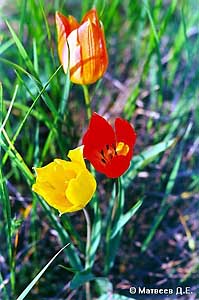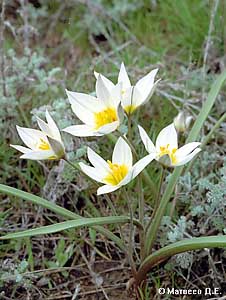The "Snowdrop" operation has begun in Volgograd region
 Illegal gathering and sale of rare plants, blossoming in spring is the
very sore problem for all southeast of Russia, and in particular, for
Volgograd and Volgograd region.
Illegal gathering and sale of rare plants, blossoming in spring is the
very sore problem for all southeast of Russia, and in particular, for
Volgograd and Volgograd region.
Annually in the markets of city it is possible to observe the same
picture: brisk sale of spring primroses (snowdrops) begins in February
- March (usually in the period from February, 14 till March, 8). Local
dealers offer wild-growing plants, first of all, brought of Krasnodar
and Stavropol territory (cyclamens, snowdrops, hellebores). Hardly
later - by the end of March, in April - the assortment is sharply
increased due to local wild-growing kinds (goose onions(bows), crested
birds, bulbocodium multi-coloured, a tulip two-floral, tulip of
Gesner, tulip of Birberstain, a hazel grouse Russian, low iris, a
glade Siberian, a lily of the valley May, and others).
 It's generally known that some of these plants - the rare kinds
recommended to list in Red books of Russia and of the Volgograd
region. For example, the bulbocodium multi-coloured is very decorative
plant, the characteristic inhabitant of open steppe slopes, has got to
itself special popularity among dealers spring colors due to large
pink blossoms. It is one of the first appears in steppe and strongly
suffers that local residents constantly collect it on bouquets or dig
out. As a result number of this kind is sharply reduced.
It's generally known that some of these plants - the rare kinds
recommended to list in Red books of Russia and of the Volgograd
region. For example, the bulbocodium multi-coloured is very decorative
plant, the characteristic inhabitant of open steppe slopes, has got to
itself special popularity among dealers spring colors due to large
pink blossoms. It is one of the first appears in steppe and strongly
suffers that local residents constantly collect it on bouquets or dig
out. As a result number of this kind is sharply reduced.
Other kinds like tulip of Birberstain and tulip of Gesner (people call
them "snowdrop" and "an azure flower") are the most often objects of
encroachments - they are collected and sold most of all.
 To stop this situation it's possible only with the joint coordinated
actions of the regional state and public ecological NGO's. First it's
necessary to improve the regional legislation in the field of wildlife
conservation. Now there is no Red book of the Volgograd area, there
are no special laws and the decisions of Regional Duma regulating use
of wild-growing plants, there is no appropriate mechanism of the
control of execution of these laws. Therefore suppression of illegal
gathering and trade in wild-growing colors is extremely complicated.
To stop this situation it's possible only with the joint coordinated
actions of the regional state and public ecological NGO's. First it's
necessary to improve the regional legislation in the field of wildlife
conservation. Now there is no Red book of the Volgograd area, there
are no special laws and the decisions of Regional Duma regulating use
of wild-growing plants, there is no appropriate mechanism of the
control of execution of these laws. Therefore suppression of illegal
gathering and trade in wild-growing colors is extremely complicated.
 But there isn't time to wait for acceptance of laws. Therefore, since
2002 members of NGO "The Regional centre of biodiversity studying and
conservation" and "The Green Orbit" with assistance of Volgograd
regional administration's Committee on preservation of environment
have developed regional operation "Snowdrop". They have prepared a
package of information materials: the reference to citizens, the
poster with the image of local kinds of the plants listed in the Red
book. All these materials were distributed on city schools, in large
shopping centers and supermarkets of the town.
But there isn't time to wait for acceptance of laws. Therefore, since
2002 members of NGO "The Regional centre of biodiversity studying and
conservation" and "The Green Orbit" with assistance of Volgograd
regional administration's Committee on preservation of environment
have developed regional operation "Snowdrop". They have prepared a
package of information materials: the reference to citizens, the
poster with the image of local kinds of the plants listed in the Red
book. All these materials were distributed on city schools, in large
shopping centers and supermarkets of the town.
It is important to note, that "Eltonsky" national park created
recently in territory of the Volgograd region has active participate
in the operation "Snowdrop". At the territory of the park were kept
the unique dry-steppe sites which avoided of total ploughing up in the
Soviet times. At the end of April the tulip fields blossom there.
During the operation conversations with dealers, journalists,
officials were spent also.
"The Regional centre of biodiversity studying and
conservation",
E-mail:
vroorcb@interdacom.ru; vea@bayard.ru